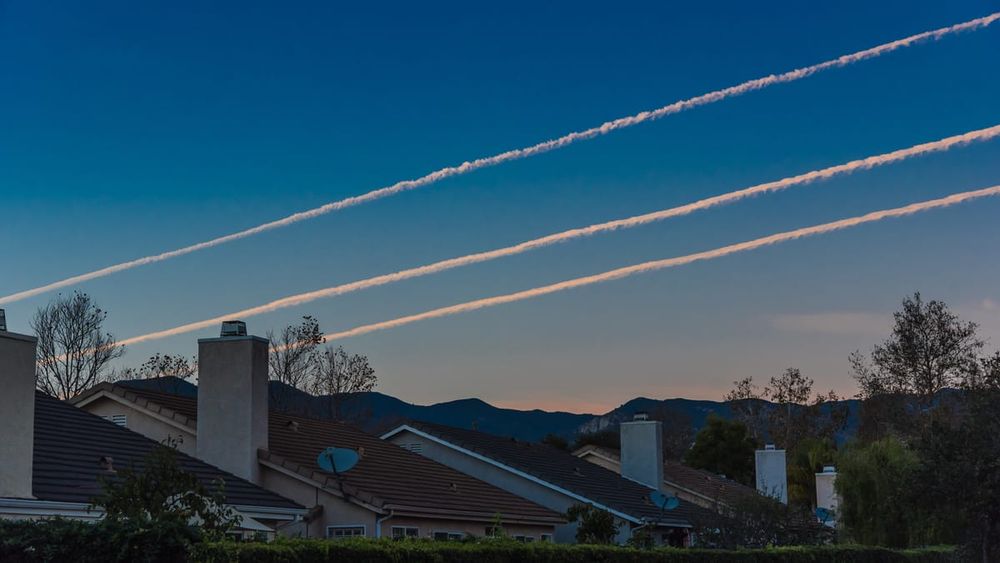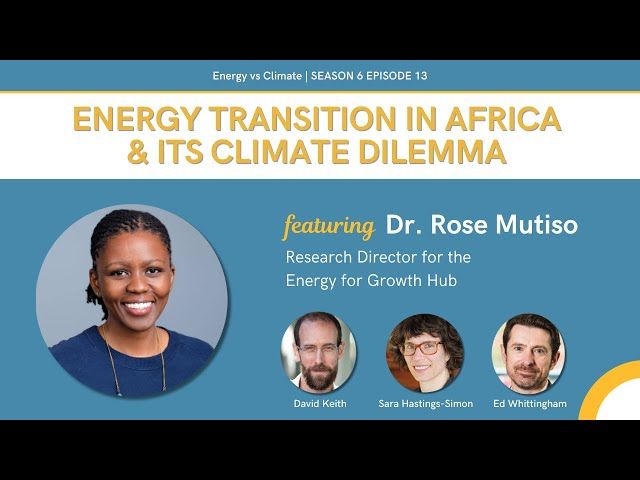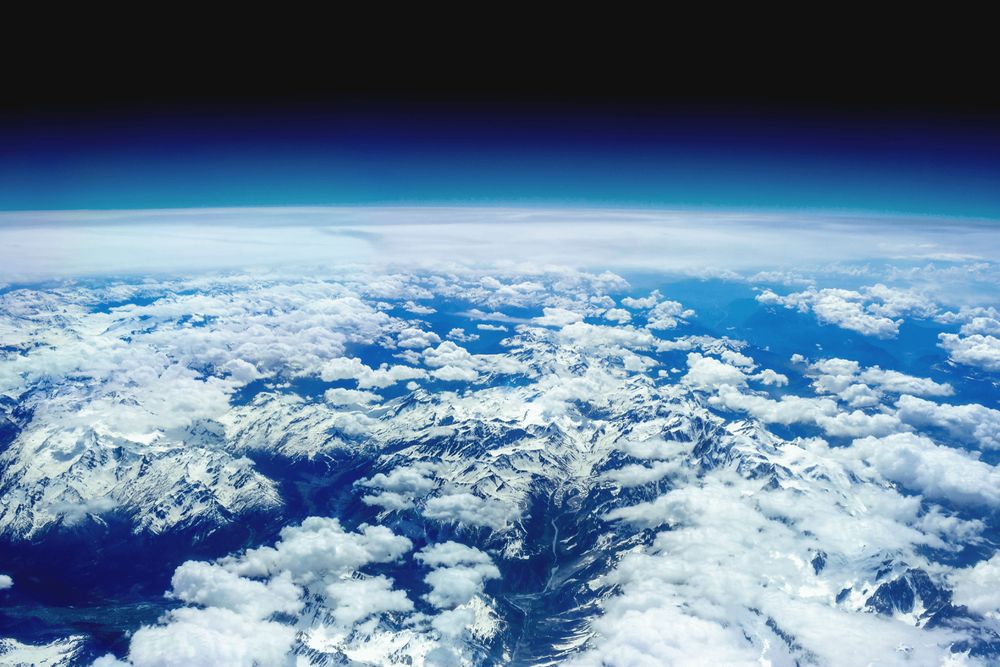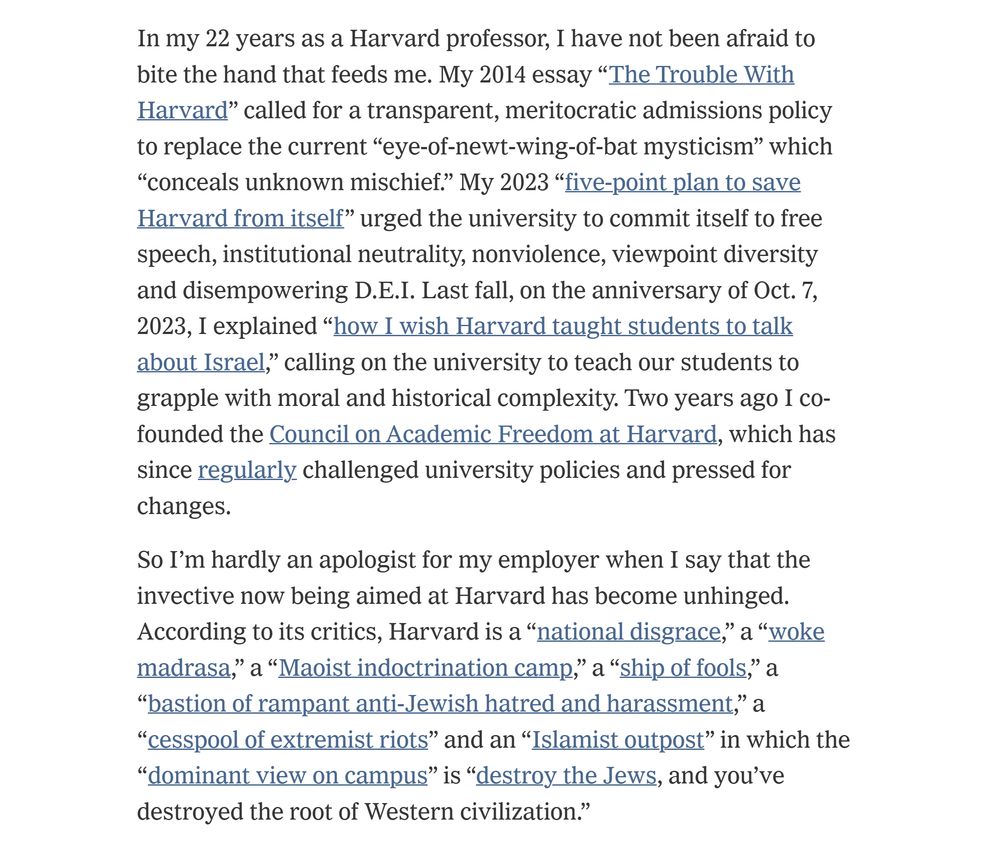David W. Keith
H-index:
81
We did approve the first headline, but we did not approve this one...
Notice how much Ray leans on ad hominem arguments. Calling me a charlatan. So what. It's not about me or Ray.
People typically resort to ad hominem attacks when their factual and ethical arguments are weak.
Ray: you should do better.
People typically resort to ad hominem attacks when their factual and ethical arguments are weak.
Ray: you should do better.
Zeke's sweet thread on our op-ed:
One can imagine this rule is simple enough to be useful in international negotiations over sunlight reflection.
My prior NYT op-ed's on this topic: davidkeith.earth/the..., and www.nytimes.com/2008...
4/4
My prior NYT op-ed's on this topic: davidkeith.earth/the..., and www.nytimes.com/2008...
4/4

The New York Times: What’s the Least Bad Way to Cool the Planet? - David Keith
By David Keith How to cool the planet? The energy infrastructure that powers our civilization must be rebuilt, replacing fossil fuels with carbon-free sources such as solar or nuclear. But even then, zeroing out emissions will not cool the planet. This is a direct consequence of the single most important fact about climate change:...
davidkeith.earth
First, it ties use of SRM to clean up of pollution, and since this pollution is mostly from burning fossil fuels, this is roughly equivalent to tying use of SRM to cuts in fossil fuels; and second, it provides a non-arbitrary fixed upper limit on how much SRM can be deployed.
3/4
3/4
Zeke and I propose a simple rule: limit use of SRM to maintaining Earth’s reflectivity against the decrease in reflectivity that will continue as pollution is cleaned up.
This rule has two useful consequences.
2/4
This rule has two useful consequences.
2/4
Zeke Hausfather and I have an NYT op-ed out today, www.nytimes.com/2025...
Here's my short blog post on the topic: davidkeith.earth/pre...
1/4
Here's my short blog post on the topic: davidkeith.earth/pre...
1/4

Opinion | A Responsible Way to Cool the Planet
A small, carefully scaled geoengineering program could compensate for the loss of cooling as we eliminate sulfur pollution.
www.nytimes.com
Reposted by David W. Keith, Dominik Wiedenhofer, Stacy D. VanDeveer
I have a new @nytimes.com guest essay w/ @davidkeith.bsky.social about sunlight reflection. We note its not a solution for climate change and at best a band aid to treat systems, and suggest if its ever done it should only be to replace the cooling from air pollution today:

Opinion | A Responsible Way to Cool the Planet
A small, carefully scaled geoengineering program could compensate for the loss of cooling as we eliminate sulfur pollution.
www.nytimes.com
Reposted by David W. Keith, Alfonso Fernández
📢 SRM360.org launches 26 Nov! 📢
SRM360 is an independent knowledge hub supporting evidence-based discussion on #SunlightReflectionMethods (SRM). As climate challenges grow, we aim to bridge the gap between complex science and public understanding. #SRM #climatescience
SRM360 is an independent knowledge hub supporting evidence-based discussion on #SunlightReflectionMethods (SRM). As climate challenges grow, we aim to bridge the gap between complex science and public understanding. #SRM #climatescience

Reposted by David W. Keith
𝗦𝗲𝗻𝗱 𝗶𝗻 𝘆𝗼𝘂𝗿 𝗤𝘀 𝘁𝗼𝗱𝗮𝘆! David & Ed welcome listener questions for EvC guest, 𝘕𝘦𝘸 𝘠𝘰𝘳𝘬 𝘛𝘪𝘮𝘦𝘴 columnist David Wallace-Wells. You can email your questions to [email protected] or just put them in the replies here.
www.energyvsclimate.com/new-york-tim...
www.energyvsclimate.com/new-york-tim...

New York Times Columnist David Wallace-Wells
Send in your questions today!
David & Ed chat with best-selling science writer David Wallace-Wells
In lieu of a live webinar, David & Ed welcome listener questions for special guest David Wallace-We...
www.energyvsclimate.com
I am particularly excited about research that explores the risks and uncertainties of hemispherically balanced deployment of stratospheric sulfates, which add cooling at no more than 0.1 degrees per decade for half a century.
Research on sunlight reflection is often driven by large or badly managed deployments.
Ken Caldeira, Cael, and I invite submissions for an AGU session assessing potential harms from limited deployment. agu.confex.com/agu/agu25/pr...
Ken Caldeira, Cael, and I invite submissions for an AGU session assessing potential harms from limited deployment. agu.confex.com/agu/agu25/pr...
And Holly Buck is a powerful writer on geoengineering. See her book "After Geoengineering." Also, her article "The Rise of Green MAGA" is essential reading for the current political environment: www.compactmag.com/a...
Here's Holly on our pod: www.energyvsclimate....
Here's Holly on our pod: www.energyvsclimate....

The Rise of Green MAGA
Geoengineering is “probably as dangerous to us as climate change itself,” Robert F. Kennedy Jr. stated on his podcast last year.
www.compactmag.com
Rose Mutiso is a great rising voice in the climate and energy space, and I recently spoke with her about the energy transition in Africa on my Energy vs Climate podcast: youtu.be/DjOcyXPxaoc...
Rose's Ted Talk on the subject is also a must watch: youtu.be/77HUdJ7Tij0...
Rose's Ted Talk on the subject is also a must watch: youtu.be/77HUdJ7Tij0...

Energy Transition in Africa & its Climate Dilemma with Dr. Rose Mutiso
*David & Ed chat with Dr. Rose Mutiso (about the tension between energy, climate, and economic development in Africa and the global south.*
They touch on many topics to do with sub-Saharan Africa, including energy production and consumption, electricity and power grids, and the vast economic inequ
youtu.be
The conversation focused on SRM in context, alongside carbon removal, adaptation, and emissions cuts. We need to evaluate how they might work together in our messy world, a topic that's on my mind every day as I write a book that tackles this question.
Enjoyed my time in Cape Town last month for the Degrees Forum 2025. I had the pleasure of joining @hollyjeanbuck.bsky.social and Rose Mutiso for a plenary session on how sunlight reflection methods (SRM) fit into the broader climate response toolbox. #DGF2025 youtu.be/jlUQl6YjIjc...

Fitting SRM into the wider landscape
Holly Buck led a session with Rose Mutiso and David Keith focused on how SRM fits into broader discussions of climate change solutions. The session began with a survey, engaging the audience to explore their own thoughts about SRM in the context of CDR, adaptation, and mitigation. Mutiso noted that
youtu.be
Canada can’t just sit on the sidelines regarding SRM research and governance. Ignoring SRM means others will make the decisions. Here’s an old op-ed Ted Parson and I wrote for the Globe & Mail that makes this point:
davidkeith.earth/the... (not our headline)
davidkeith.earth/the... (not our headline)

The Globe and Mail: Solar geoengineering – Science fiction – or saviour? - David Keith
At the time of this post, David Keith was a professor in Harvard's Schools of Engineering and of Public Policy, and founder at Carbon Engineering. Edward Parson is professor and co-director of the Emmett Institute on Climate Change and the Environment at UCLA, and senior research associate at the Centre for Global Studies,...
davidkeith.earth
Lisa Dilling leads SRM research at the Environmental Defense Fund and has written about the need to explore the potential impacts of SRM before any sort of deployment is considered:
blogs.edf.org/climat...
blogs.edf.org/climat...

Why it’s time to explore the potential impacts of Solar Radiation Modification
The impacts from climate change will continue to escalate in the years ahead, and a growing number of scientists, philanthropies and companies have become interested in strategies to lower global temperatures more quickly. One of the options is reflecting some sunlight back into space. Because
blogs.edf.org
This conversation grew out of meetings that several Canadian SRM leaders, including Ted Parson and Doug MacMartin, had with Canadian government officials and NGOs about a possible SRM research program in Canada.
Can Canada afford to ignore sunlight reflection methods (SRM)? I'm joining @ldilling.bsky.social from the @envdefensefund.bsky.social for a discussion hosted by the Transition Accelerator, a major Canadian NGO focused on the climate. June 10, 12pm ET.
Join the Live Q&A: transitionaccelerato...
Join the Live Q&A: transitionaccelerato...

Can We Afford to Ignore Solar Geoengineering?
Should Canada act now to build its SRM research capacity and leadership? How can we foster the local expertise and international partnerships we’ll need to control the technology should solar geoengineering become a reality?
transitionaccelerator.ca
Superb op-ed from Steven Pinker (@sapinker on X) calling out the right's absurd Harvard Derangement Syndrome.
Harvard has some woke, but its peak has passed, and claims of many on the right are disconnected from the reality I saw as a faculty member.
www.nytimes.com/2025...
Harvard has some woke, but its peak has passed, and claims of many on the right are disconnected from the reality I saw as a faculty member.
www.nytimes.com/2025...

I appreciate the way Andreas has made a careful case for strong actions such as civil disobedience to protect humans and nature. Looking fwd having Andreas join us on Energy vs Climate this morning. (Feel free to join us live)
www.energyvsclimate....
www.energyvsclimate....

You're Invited: Has the World Surrendered to Climate Breakdown? Andreas Malm, author of "How to Blow Up a Pipeline," on EvC May 23 at 10AM ET
"The climate crisis calls not for moderation, but for militant action."
- Andreas Malm
Join us for a live recording of Energy vs Climate with special guest Andreas Malm, author of How the World Surrendered to Climate Breakdown and How to Blow Up a Pipeline: Learning to Fight in a
www.energyvsclimate.com
See, the concluding section of the article, "If not a negotiated moratorium, then what?” for practical thinking on how governance can move forward without halting research progress.
States can begin research programs while making it clear that deployment is premature. This allows for bottom-up norm setting and transparency without the risks of a negotiated moratorium.
Many people, including (sometimes) me, have argued that a moratorium could provide a safe space under which research can flourish. But a moratorium would not magically create research. And as Sue and Dan point out, there are many ways in which a moratorium might inhibit research.
Smart argument against a moratorium for deployment of sunlight reflection SRM from Sue Biniaz (former top US climate negotiator) and @bodansk.bsky.social (environmental lawyer).
www.justsecurity.org...
www.justsecurity.org...

Why Global “Moratorium” on SRM Deployment Should Get a Chilly Reception
A bottom-up norm-setting approach would rectify the concerns of agreeing to a global moratorium on solar radiation management deployment.
www.justsecurity.org
New high-quality survey on public attitudes toward sunlight reflection in Great Britain:
16% support SAI deployment.
46% are unsure.
Younger people are more supportive overall.
Interesting signals on awareness and openness to geoengineering in general.
yougov.co.uk/health/...
16% support SAI deployment.
46% are unsure.
Younger people are more supportive overall.
Interesting signals on awareness and openness to geoengineering in general.
yougov.co.uk/health/...

Dimming the sun; brightening clouds; planting forests: would Britons support geoengineering to combat climate change? | YouGov
Most Britons say a drastic change in the steps taken to combat climate change is needed in order to avert its worst effects
yougov.co.uk
